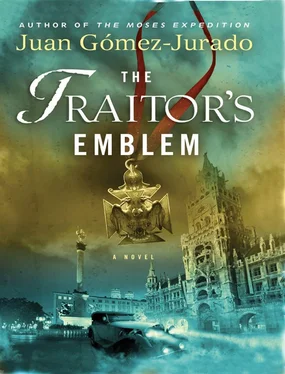Juan Gomez-Jurado - The Traitor's emblem
Здесь есть возможность читать онлайн «Juan Gomez-Jurado - The Traitor's emblem» весь текст электронной книги совершенно бесплатно (целиком полную версию без сокращений). В некоторых случаях можно слушать аудио, скачать через торрент в формате fb2 и присутствует краткое содержание. Жанр: Триллер, на английском языке. Описание произведения, (предисловие) а так же отзывы посетителей доступны на портале библиотеки ЛибКат.
- Название:The Traitor's emblem
- Автор:
- Жанр:
- Год:неизвестен
- ISBN:нет данных
- Рейтинг книги:4 / 5. Голосов: 1
-
Избранное:Добавить в избранное
- Отзывы:
-
Ваша оценка:
- 80
- 1
- 2
- 3
- 4
- 5
The Traitor's emblem: краткое содержание, описание и аннотация
Предлагаем к чтению аннотацию, описание, краткое содержание или предисловие (зависит от того, что написал сам автор книги «The Traitor's emblem»). Если вы не нашли необходимую информацию о книге — напишите в комментариях, мы постараемся отыскать её.
The Traitor's emblem — читать онлайн бесплатно полную книгу (весь текст) целиком
Ниже представлен текст книги, разбитый по страницам. Система сохранения места последней прочитанной страницы, позволяет с удобством читать онлайн бесплатно книгу «The Traitor's emblem», без необходимости каждый раз заново искать на чём Вы остановились. Поставьте закладку, и сможете в любой момент перейти на страницу, на которой закончили чтение.
Интервал:
Закладка:
“Mama, what do you know about what happened to Papa?”
For a few moments Ilse seemed to awake from her lethargy. A spark of light burned deep in her eyes, like the last embers of a bonfire. She held Paul’s chin and stroked his face gently.
“Paul, please. Forget it; forget everything you’ve heard tonight. Your father was a good man who died tragically in a shipwreck. Promise me that you’ll cling to that-that you won’t go looking for a truth that doesn’t exist-because I couldn’t bear to lose you. You’re all I have left. My boy Paul.”
The first glimmers of dawn cast long shadows on the Munich streets, carrying away the rain.
“Promise me,” she insisted, her voice fading.
Paul hesitated before answering.
“I promise.”
10
“Whooooah!”
The coal merchant’s cart screeched to a halt on the Rheinstrasse. The two horses stamped restlessly, their eyes covered by blinkers and their hindquarters blackened by sweat and soot. The coal merchant jumped to the ground and distractedly ran his hand along the side of the cart, which bore his name, Klaus Graf, even though only the first two letters were still legible.
“Clean this, Hulbert! I like my customers to know who is bringing them their raw material,” he said almost amiably.
The man in the driver’s seat removed his hat, pulled out a rag still bearing distant memories of the original color of the cloth, and set about working on the wood, whistling. This was his only way of expressing himself, as he was a mute. The melody was gentle and swift: he, too, seemed happy.
It was the perfect moment.
Paul had been following them all morning, ever since they came out of the stables Graf kept in Lehel. He’d also observed them the previous day and understood that the best time to ask for a job would be just before one in the afternoon, after the coal man’s midday rest. Both he and the mute had polished off large sandwiches and a couple of liters of beer. Left behind was the bad-tempered drowsiness of early morning, when the dew accumulated on the cart as they waited for the coal store to open. Gone, too, was the irritable tiredness at the end of the day, when they’d drink their final beer in silence, the dust constricting their throats.
If I can’t do it, God help us, thought Paul desperately.***
Paul and his mother had spent two days trying to find work and had eaten nothing whatsoever in that time. Pawning the watch had given them enough money for two nights in a boardinghouse and a breakfast of bread and beer. His mother had persevered looking for work, but they’d soon learned that a job was a pipe dream in those days. Women had been thrown out of the positions they’d occupied during the war when the men returned from the front. Not because the employers wanted this, naturally.
“Damn this government and its directives,” a baker had said to them when they’d asked him for the impossible. “They’ve been forcing us to hire war veterans when women do the work just as well and charge much less.”
“Did women really do the work as well as men?” Paul asked him insolently. He was in a bad mood. His stomach was growling and the smell of bread baking in the ovens was making matters worse.
“Better sometimes. I had one woman who could work the dough better than anybody.”
“So, why’d you pay them less?”
“Well, it’s obvious,” said the baker, shrugging his shoulders. “They’re women.”
If there was any logic to this, Paul couldn’t understand it, even though his mother and the employees in the workroom nodded in agreement.
“You’ll understand when you’re older,” one said as Paul and his mother left. Then they all burst out laughing.
Paul’s luck hadn’t been better. The first thing he was always asked, before the potential employer found out if he knew how to do anything, was whether he was a war veteran. He had suffered many disappointments in the space of a few hours, so he decided to confront the problem as rationally as he could. Trusting to fortune, he decided to follow the coal man, to study him and approach him in the best way possible. He and his mother had managed to stay in the boardinghouse for a third night after promising to pay the following day, and because the landlady felt sorry for them. She even gave them a dish of thick soup with bits of potato floating in it, and a piece of black bread.
So there was Paul, crossing the Rheinstrasse. A bustling and happy place filled with peddlers, newspaper sellers, and knife grinders, who hawked their boxes of matches, the latest news, or the benefits of well-sharpened knives. The smell of the bakeries mixed with the dung of horses, which were much more common in Schwabing than cars.
Paul took advantage of the moment when the coal man’s assistant left to fetch the doorman of the building they were going to supply, to get him to open the door to the cellar. Meanwhile, the coal man prepared the enormous birch-wood baskets in which they transported their wares.
Maybe if he’s alone he’ll be friendlier. People react to strangers differently in front of their juniors, Paul thought as he approached.
“Good afternoon, sir.”
“What the hell do you want, lad?”
“I need a job.”
“Get lost. I don’t need anyone.”
“I’m strong, sir, and I could help you unload this cart really fast.”
The coal man deigned to glance at Paul for the first time, looking him up and down. Paul was wearing his black trousers, white shirt, and sweater, and still looked like a waiter. Compared to the corpulence of the big man in front of him, Paul felt like a weakling.
“How old are you, lad?”
“Seventeen, sir,” lied Paul.
“Even my aunt Bertha, who was terrible at guessing people’s ages, poor thing, wouldn’t put you at any more than fifteen. Besides, you’re too scrawny. Get lost.”
“I turn sixteen on May twenty-second,” said Paul, sounding offended.
“In any case, you’re no use to me.”
“I can lug a basket of coal perfectly well, sir.”
He climbed up onto the cart with great agility, took a shovel, and filled up one of the baskets. Then, trying not to let the effort show, he put the straps over his shoulder. He could tell that the fifty kilos were destroying his shoulders and lower back, but he managed a smile.
“See?” he said, using all his willpower to keep his legs from buckling.
“Kid, there’s more to it than picking up a basket,” said the coal man, taking a packet of tobacco out of his pocket and lighting a battered pipe. “My old aunt Lotta could pick up that basket with less fuss than you. You need to be able to carry it down steps that are as damp and slippery as a showgirl’s crotch. The cellars we go down to almost never have any light, because the building administrators don’t give a damn if we smash our heads open. And maybe you could get one basket down, maybe two, but by the third-”
Paul’s knees and shoulders could no longer take the weight and the boy fell facedown onto the pile of coal.
“-you’ll tumble over, as you’ve just done. And if that were to happen to you on those narrow stairs, yours wouldn’t be the only skull to get broken.”
The lad clambered up on stiff legs.
“But-”
“There’s no ‘but’ that’ll make me change my mind, kid. Get off my cart.”
“I… could tell you a way of making your business better.”
“Just what I need… And what would that be?” asked the coal man with a mocking laugh.
“You lose a lot of time between finishing one delivery and beginning the next because you have to go to the warehouse to collect more coal. If you bought a second cart…”
“That’s your bright idea, eh? A good cart with steel axles to take all the weight we carry costs at least seven thousand marks, not counting the harnesses and horses. Have you got seven thousand marks in those tatty trousers? I’d guess not.”
Читать дальшеИнтервал:
Закладка:
Похожие книги на «The Traitor's emblem»
Представляем Вашему вниманию похожие книги на «The Traitor's emblem» списком для выбора. Мы отобрали схожую по названию и смыслу литературу в надежде предоставить читателям больше вариантов отыскать новые, интересные, ещё непрочитанные произведения.
Обсуждение, отзывы о книге «The Traitor's emblem» и просто собственные мнения читателей. Оставьте ваши комментарии, напишите, что Вы думаете о произведении, его смысле или главных героях. Укажите что конкретно понравилось, а что нет, и почему Вы так считаете.












